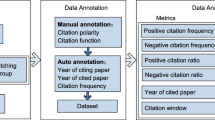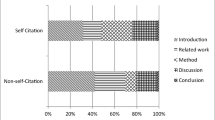Abstract
Citation is an important process of scientific activities, reflecting the inheritance and development of knowledge. However, citations representing different sentiment polarities function differently in knowledge construction, especially negative citations holding critical views, which deserve more in-depth study. This paper selected papers on SVM from 1995 to 2020, and used the stratified random sampling method to obtain 3,337 citation sentences from 46,157 citations, coding several attributes such as citation polarity, to analyze the relationship between negative citation and the impact of cited paper and the role of negative citation in the development of SVM technology. The results of the study found that negative citations do not reduce the literature impact; papers with a certain negative citation ratio would have a higher impact; and the impact of those partially dismissed papers would be even higher. In addition, negative citation presents different characteristics in different periods of the development of SVM, which has a certain promotion effect on the improvement of this technology.








Similar content being viewed by others
References
Abujbara, A., Ezra, J., & Radev, D. (2013). Purpose and polarity of citation: Towards NLP-based bibliometrics. Proceedings of the 2013 conference of the North American chapter of the association for computational linguistics: Human language technologies, pp. 596–606.
Athar, A. (2011). Sentiment analysis of citations using sentence structure-based features. Proceedings of the ACL 2011 student session, pp. 81–87.
Athar, A., & Teufel, S. (2012). Context-enhanced citation sentiment detection. Conference of the North American chapter of the association for computational linguistics (NAACL), pp. 597–601.
Bordignon, F. (2020). Self-correction of science: A comparative study of negative citations and post-publication peer review. Scientometrics, 124, 1225–1239.
Brooks, T. A. (1986). Evidence of complex citer motivations. Journal of the American Society for Information Science, 37(1), 34–36.
Cano, V. (1989). Citation behavior: Classification, utility, and location. Journal of the American Society for Information Science, 40(4), 284–290.
Case, D. O., & Higgins, G. M. (2000). How can we investigate citation behavior? A study of reasons for citing Literature in communication. Journal of the American Society for Information Science, 51(7), 635–645.
Catalini, C., Lacetera, N., & Oettl, A. (2015). The incidence and role of negative citations in science. Proceedings of the National Academy of Sciences of the United States of America, 112(45), 13823–13826.
Chubin, D. E., & Moitra, S. D. (1975). Content analysis of references: Adjunct or alternative to citation counting? Social Studies of Science, 5, 423–441.
Cohen, A. (1960). Coefficient of agreement for nominal scales. Educational and Psychological Measurement, 20(1), 37–46.
Cortes, C., & Vapnik, V. (1995). Support-vector networks. Machine Learning, 20, 273–297.
Cronin, B., & Meho, L. (2006). Using the H-Index to rank influential information scientists. Journal of the American Society for Information Science and Technology, 57(9), 1275–1278.
Danell, J. A. B. (2012). Representation and negotiation of complementary and alternative medicine: A citation context analysis. Science Communication, 34(3), 299–333.
Garfield, E. (1964). Can citation indexing be automated?. Proceedings of the symposium on statistical association, pp. 84–90.
Geras, A., Siudem, G., & Gagolewski, M. (2020). Should we introduce a dislike button for academic articles? Journal of the Association for Information Science and Technology, 71(2), 221–229.
Ikram, M. T., & Afzal, M. T. (2019). Aspect based citation sentiment analysis using linguistic patterns for better comprehension of scientific knowledge. Scientometrics, 119(1), 73–95.
Jochim, C., & Schütze, H. (2014). Improving citation polarity classification with product reviews. Meeting of the association for computational linguistics (ACL), pp. 42–48.
Khamsi, R. (2020). Coronavirus in context: Scite.ai tracks positive and negative citations for COVID-19 literature. Nature,
Kim, I. C., & Thoma, G. R. (2015). Automated classification of author’s sentiments in citation using machine learning techniques: A preliminary study. IEEE conference on computational intelligence in bioinformatics and computational biology (CIBCB), pp. 1–7.
Kumar, S. (2016). Structure and dynamics of signed citation networks. International conference companion on World Wide Web, pp. 63–64.
Ma, Z., Nam, J., & Weihe, K. (2016). Improve sentiment analysis of citations with author modelling. Proceedings of NAACL-HLT, pp. 122–127.
MacRoberts, M. H., & MacRoberts, B. R. (1984). The negational reference: Or the art of dissembling. Social Studies of Science, 14(1), 91–94.
Moravcsik, M. J., & Murugesan, P. (1975). Some results on the function and quality of citations. Social Studies of Science, 5(1), 86–92.
Munkhdalai, T., Lalor, J., & Yu, H. (2016). Citation analysis with neural attention models. International workshop on health text mining and information analysis, pp. 69–77.
Nicholson, J., Mordaunt, M., Lopez, P., Uppala, A., Rosati, D., Rodrigues, N., Grabitz, P., & Rife, S. (2021). Scite: A smart citation index. Advance Publication. https://doi.org/10.1162/qss_a_00146
Rousseau, R., Egghe, L., & Guns, R. (2018). Becoming Metric-Wise: A bibliometric guide for researchers. Chandos Publishing.
Shadish, W. R., Tolliver, D., Gray, M., et al. (1995). Author judgements about works they cite: Three studies from psychology journals. Social Studies of Science, 25(3), 477–498.
Suelzer, E. M., Deal, J., Hanus, K. L., Ruggeri, B., Sieracki, R., & Witkowski, E. (2019). Assessment of citations of the retracted article by Wakefield et al with fraudulent claims of an association between vaccination and autism. JAMA Network Open, 2(11), e1915552. https://doi.org/10.1001/jamanetworkopen.2019.15552
Tang, R., & Safer, M. A. (2008). Author-rated importance of cited references in biology and psychology publications. Journal of Documentation, 64(2), 246–272.
Teufel, S., Siddharthan, A., & Tidhar, D. (2006). Automatic classification of citation function. Proceedings of the 2006 conference on empirical methods in natural language processing (EMNLP), pp. 103–110.
Vinkler, P. (1987). A quasi-quantitative citation model. Scientometrics, 12, 47–72.
Vyas, V., Ravi, K., Ravi, V., et al. (2020). Article citation study: Context enhanced citation sentiment detection.
Xu, J., Zhang, Y., Wu, Y., et al. (2015). Citation sentiment analysis in clinical trial papers. AMIA annual symposium proceedings, pp. 1334–1341.
Yan, E., Chen, Z., & Li, K. (2020). Authors’ status and the perceived quality of their work: Measuring citation sentiment change in Nobel articles. Journal of the Association for Information Science and Technology, 71(3), 314–324.
Zhou, L., Amadi, U., & Zhang, D. (2020). Is self-citation biased? An investigation via the lens of citation polarity, density, and location. Information Systems Frontiers, 22, 77–90.
Acknowledgements
This work is partially supported by Grant from the Natural Science Foundation of China (Nos. 61772103, 61806038), Ministry of Education Humanities and Social Science Project (Nos. 18YJCZH208), Natural Science Foundation of China (Nos. 61976036). We also thank the anonymous reviewers for their constructive comments and suggestions.
Author information
Authors and Affiliations
Corresponding authors
Rights and permissions
About this article
Cite this article
Xu, L., Ding, K. & Lin, Y. Do negative citations reduce the impact of cited papers?. Scientometrics 127, 1161–1186 (2022). https://doi.org/10.1007/s11192-021-04214-4
Received:
Accepted:
Published:
Issue Date:
DOI: https://doi.org/10.1007/s11192-021-04214-4




